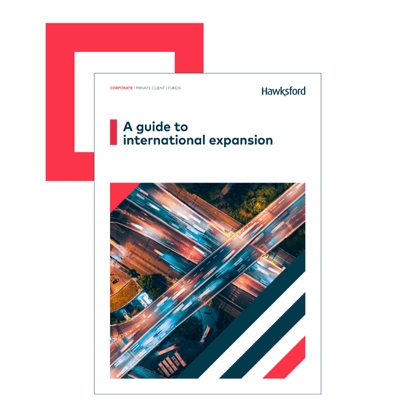Hong Kong’s Financial Secretary, Paul Chan, presented the Hong Kong Budget 2024 (the Budget) on 28 February.
This year’s Budget addressed the need for Hong Kong’s economy to be revitalised through introducing measures aimed at boosting economic recovery, driving sector-specific growth and providing support for small and medium enterprises (SMEs).
Assisting SMEs in overcoming financial challenges
To extend support to SMEs in overcoming financial challenges, this year’s Budget covers several supportive measures.
Alleviating capital flow concerns
The deadline for applying to the 80% and 90% Guarantee Products under the SME Financing Guarantee Scheme has been pushed back by two years, until March 2026. There will also be a HK$10 billion increase in the scheme's total guaranteed commitment.
The Hong Kong Monetary Authority (HKMA) will be keeping an open line of communication with banks and the commercial sectors, ensuring a supportive approach is adopted to address the liquidity needs of enterprises. Moreover, the authority will not insist on the repayment of loans triggered by a drop in collateral value.
This can provide some breathing space for companies facing temporary liquidity issues, allowing business owners to focus on stabilising and growing their operations.
Facilitating digital transformation
As part of the Digital Transformation Support Pilot Programme, SMEs operating in the food and beverage and retail sectors will be encouraged to explore and select from various ready-to-use basic digital solutions. These solutions will help with digital payment and shopfront sales, online promotion, as well as customer management.
Subsidies will be available to help cover the costs of adopting new technologies. It is projected that this initiative will support the digital upgrade of at least 8,000 SMEs.
Providing financial support for e-commerce projects
The Dedicated Fund on Branding, Upgrading, and Domestic Sales (BUD Fund) has seen continuous enhancements, such as an increased cumulative funding ceiling per enterprise and smoother application processes.
To help SMEs sharpen their competitive abilities and break into Mainland China and foreign markets, a further HK$500 million will be added to the fund. Part of this is the rollout of 'E-commerce Easy', which will provide financial support of up to HK$1 million for each enterprise launching e-commerce ventures in Mainland China.
Unlocking tax savings
Effective from the year of assessment 2024/25, the introduction of two enhancement measures will improve the deduction of expenses under profits tax. Corporate taxpayers will benefit from a tax deduction for expenses incurred in returning leased premises to their original condition.
Additionally, the current 25-year restriction on claiming the Commercial Building Allowance (CBA) and Industrial Building Allowance (IBA) will be removed. Subsequent property owners can now claim these allowances based on criteria like the construction cost and the prior owner's balancing charge.
Drawing in talent, capital, and enterprises
Businesses may expect an improvement in Hong Kong's economy with measures to draw in more talent, capital and enterprises. To ensure this, the below strategies will be employed as highlighted in the Budget.
Securing talent
Businesses will have a more diverse talent base to draw from with ongoing talent admission schemes like the Top Talent Pass Scheme (TTPS). The Labour and Welfare Bureau's mid-year review of these arrangements will ensure that these measures remain competitive and aligned with the workforce demands of businesses.
To further promote Hong Kong as an international talent hub, the Hong Kong Talent Engage (HKTE) plans to hold a Global Talent Summit along with the Guangdong-Hong Kong-Macao Greater Bay Area High-quality Talent Development Conference in May. These will foster the exchange of skilled professionals within the Greater Bay Area (GBA), expanding the range of talents and proficiencies that businesses can leverage.
Diversifying sources of capital
The government is also venturing into untapped capital sources, such as those in the Middle East. A significant achievement in this direction was the listing of the Asia-Pacific region's first Exchange Traded Fund (ETF) in Hong Kong last year, which focuses on Saudi Arabian stocks.
Additionally, the HKMA is collaborating with various financial institutions to list an ETF in the Middle East tracking Hong Kong stock indices.
Attracting overseas companies to re-domicile in Hong Kong
The government has already introduced user-friendly fund re-domiciliation mechanisms for open-ended fund companies and limited partnership funds, aimed at attracting foreign funds to set up and operate in Hong Kong.
Moving forward, the government will propose new legislation by early 2024. This legislation will ease the process for overseas companies to re-domicile in Hong Kong.
Supporting the innovation and technology (I&T) sector through new partnerships
In a major stride for Hong Kong's I&T sector, March 2024 will see the signing of partnership agreements between the Office for Attracting Strategic Enterprises (OASES) and more strategic enterprises. Combined with the earlier batch of 30 companies, these partnerships are set to channel over HK$40 billion in investments into the region and create around 13,000 jobs.
The presence of these enterprises in Hong Kong may draw in partners across their industry chains, fostering a rich ecosystem that propels the development of the I&T sector.
Fostering investment opportunities
The Hong Kong Investment Corporation Limited (HKIC) is set to stimulate the growth of strategic industries in Hong Kong by attracting I&T companies. This will be achieved through a series of direct and co-investment projects slated for launch in the first half of 2024, targeting key areas such as life technology, green technology and finance, as well as semiconductors and chips.
The HKIC will also promote greater involvement of its investment portfolio companies with local, Mainland China, and overseas I&T networks. This will open new avenues for application and development, paving the way for identifying prospective investors and clientele.
To boost Hong Kong's appeal to global businesses and investors, relevant summits and events will be held to enhance collaboration across the investment, industry, academic, and research sectors. This will play a part in nurturing the growth of I&T enterprises through various development phases.
Enhancing I&T development across various industries
The role of I&T is fundamental in steering Hong Kong's economy and society to achieve high-quality development milestones. To this end, the government has allocated considerable resources to nurture a robust I&T ecosystem, with a focus on upgrading infrastructure, enhancing research capabilities, and attracting skilled talent.
Nurturing I&T start-ups
Since its launch, the Corporate Venture Fund under the Hong Kong Science and Technology Parks Corporation (HKSTPC) has put in nearly HK$400 million to invest in 31 promising start-ups, securing private investments amounting to HK$12.6 billion.
To continue this momentum, HKSTPC plans to roll out the Co-acceleration Programme. With this, I&T start-ups may expect an enhanced ecosystem of support that can speed up their growth and expand their market reach.
Establishing an AI Supercomputing Centre
To capitalise on the growth of Artificial Intelligence (AI), the establishment of an AI Supercomputing Centre is being expedited. Slated to kick off operations as soon as this year, the facility is on a fast track to becoming a key resource for high-performance computing power.
HK$3 billion will also be allocated to initiate a three-year AI Subsidy Scheme. This scheme is designed to enable enterprises to use the centre’s computing power for scientific advancements. Moreover, the subsidy will also be used to facilitate activities that attract AI talent, businesses, and research projects to Hong Kong.
Funding new industrialisation development
For enterprises advancing into smart production, the government is introducing a HK$10 billion New Industrialisation Acceleration Scheme (NIAS) this year. Enterprises in AI and data science, life and health technology, advanced manufacturing, and new energy technology can get up to HK$200 million in funding support on a matching basis.
Enterprises involved in the NIAS may also be able to access subsidies to attract research talent through the Research Talent Hub. Moreover, in a pilot approach, enterprises may employ a select group of non-local technical personnel via the Technology Talent Admission Scheme. This move may help to quicken the process of establishing and running advanced manufacturing facilities in Hong Kong.
Supporting life and health technology
Start-ups operating in life and health technology will receive a significant boost, with $200 million allocated for incubation programmes. An InnoLife Healthtech Hub within the Hong Kong-Shenzhen Innovation and Technology Park (HSITP) is also in the works to attract world-class research teams and talent.
Fostering research and development (R&D) of microelectronics
In response to the global surge in demand for semiconductors, the Hong Kong Microelectronics Research and Development Institute (HKMSRDI) will be launched this year to promote R&D efforts. The HKMSRDI will play a pivotal role in driving research collaborations on third-generation semiconductors, connecting universities, R&D centres, and industry stakeholders.
Embracing green transformation
Hong Kong is also positioning itself as a leading international centre for green finance. Businesses eyeing a shift towards green transformation can thus anticipate a robust support system.
Extending the Green and Sustainable Finance Grant Scheme
To date, the government has facilitated the issuance of over 340 green and sustainable debt instruments in Hong Kong, disbursing subsidies to qualified bond issuers and loan borrowers under the Green and Sustainable Finance Grant Scheme.
This scheme will now be extended until 2027, with the subsidy coverage widened to include transition bonds and loans. It was initially due to expire in mid-2024. Businesses will have more time to leverage Hong Kong's transition financing platform in their decarbonisation efforts.
Providing early-stage funding support for green fintech
For businesses focusing on green fintech, the upcoming Green and Sustainable Fintech Proof-of-Concept Subsidy Scheme will come in handy. Expected to roll out in the next few months, the scheme will provide crucial financial assistance in the preliminary stages of green fintech initiatives.
Assisting companies in sustainability reporting
Companies and financial institutions will also be receiving guidance to align their sustainability disclosure practices with global standards, as part of Hong Kong's initiative to strengthen green and sustainable finance development.
The Financial Services and the Treasury Bureau, in collaboration with the Securities and Futures Commission (SFC), will be putting together a roadmap and vision statement. This will facilitate better sustainability reporting and data analysis.
Other key changes
With the announcement of latest support measures, it is also important for businesses to anticipate and prepare for changes that may affect their industry as well as their employees.
Addressing property market concerns
Leading up to the Budget, there have been growing demands for the government to remove cooling measures to boost the ailing property market.
This year’s Budget announced the cancellation of all property cooling measures. Effective immediately, there will be no obligation to pay Special Stamp Duty (SSD), Buyer's Stamp Duty (BSD), or New Residential Stamp Duty (NRSD) on any residential property transactions.
Since this repeal, Hong Kong's real estate developers have seen an uptick in their stock values.
Hong Kong’s high property prices makes it challenging for the city to attract and retain talent. Not only will this announcement boost investments in the property sector, but it will also make it more affordable for local and foreign employees to live and work in Hong Kong for the long term.
One-off relief measures for taxpayers
Considering current economic challenges, the Budget will roll out the following measures to help taxpayers:
- Rates concession for domestic properties for the first quarter of 2024/25, capped at HK$1,000 for each rateable property
- Rates concession for non-domestic properties for the first quarter of 2024/25, capped at HK$1,000 for each rateable property
- Reduction of salaries tax and tax under personal assessment for the year of assessment 2023/24 by 100%, with a limit of HK$3,000
- Reduction of profits tax for the year of assessment 2023/24 by 100%, with a limit of HK$3,000
Tax rate increased for high earners
Beginning in the year of assessment 2024/25, the government will introduce a two-tiered standard rates regime for salaries tax and tax under personal assessment.
For those whose net income surpasses HK$5 million, the tax structure will be divided. The standard 15% rate will apply to the first HK$5 million of net income, and any amount beyond that will incur a 16% tax rate. This change is anticipated to impact around 12,000 taxpayers that earn a higher income.
Increase in business registration fees
For those keen on business registration in Hong Kong, this next change will be worth noting. Starting from 1 April 2024, business registration fees will rise by HK$200, reaching a new total of HK$2,200. However, as a counterbalance to this increase, the government will forgo the business registration levy of HK$150 for two years.
15% global minimum tax on large multinational enterprise (MNE) groups
The government will also be proceeding with the 15% global minimum tax and Hong Kong minimum top-up tax on large MNE groups from 2025. This was proposed by the Organisation for Economic Co-operation and Development (OECD) to combat base erosion and profit shifting.
Consultations on these measures are currently underway, with a legislative proposal anticipated for submission to the Legislative Council in the latter half of this year. Hong Kong joins over 140 countries and jurisdictions that are gradually implementing such rules. Singapore, too, has announced similar measures in its latest Budget.
Moving forward
Commenting on this year’s Budget, the Director of our Hong Kong office, Francesco Montonati, said: “Support for SMEs remains strong, with enhancement of existing government funding schemes and new measures aiming to boost retail businesses.”
By addressing immediate challenges and setting the stage for long-term prosperity, this year’s Budget highlights the region’s commitment to enhancing its competitiveness. It reflects a careful consideration of both domestic and global demands, aiming to ensure that Hong Kong remains an attractive destination for business, investment, and talent.

Speak to our experts today
Explore how our corporate services can elevate your business needs
Updated on








